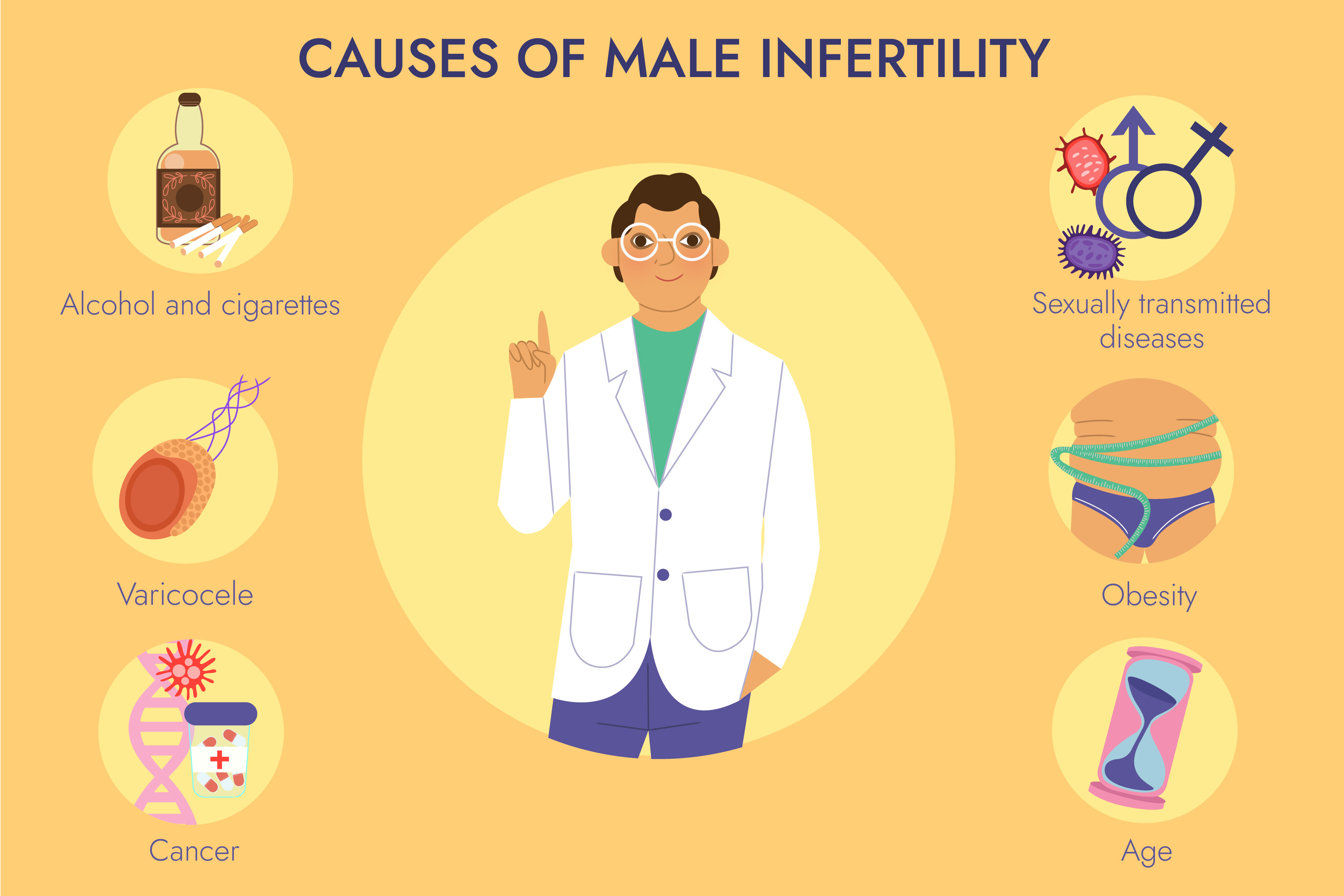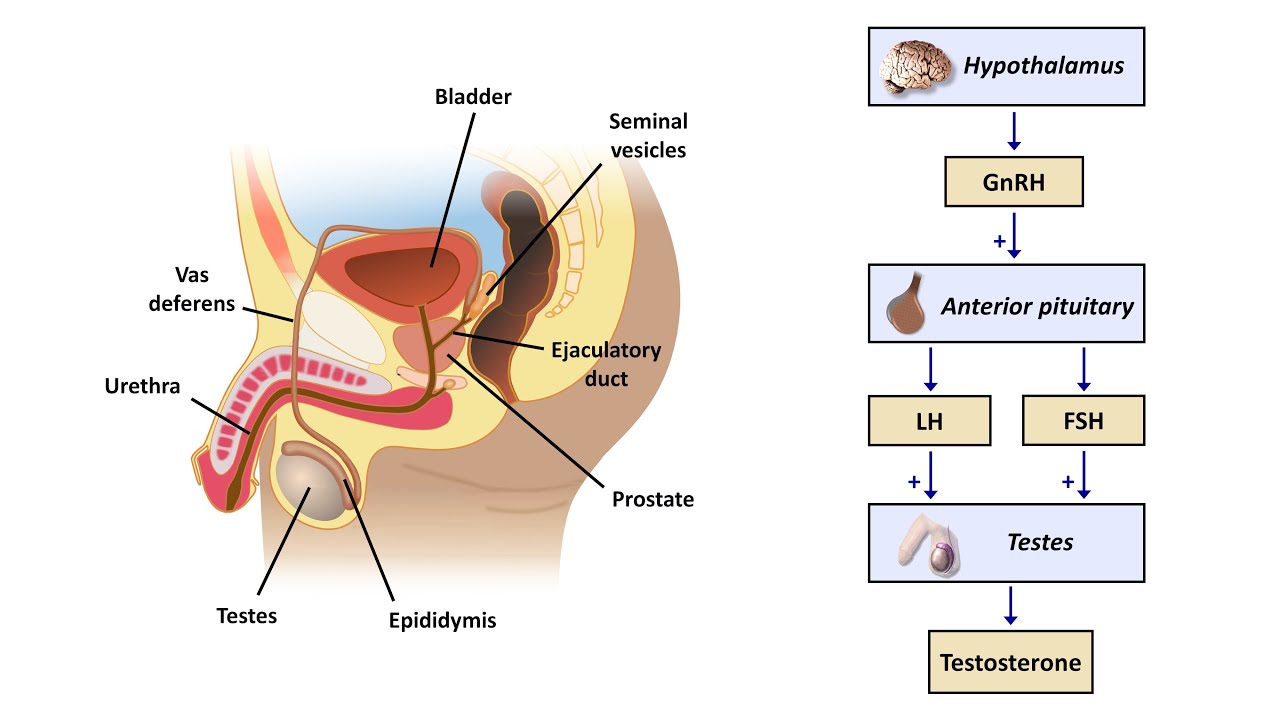Understanding Male Infertility And Treatment Options
Male infertility can be caused by sperm that doesn't work well, doesn't make enough sperm, or can't get to the egg. It may be caused by several things, including but not limited to illness, injury, chronic health issues, lifestyle choices, and more.
Author:Suleman ShahReviewer:Han JuJan 17, 202353.8K Shares1.4M Views

Male infertilitycan be caused by sperm that doesn't work well, doesn't make enough sperm, or can't get to the egg. It may be caused by several other things, including but not limited to illness, injury, chronic healthissues, lifestyle choices, and more.
The inability to produce a child despite regular, unprotected sexual activity for a year or more affects around one-seventh of all couples. The male partner may be somewhat responsible for infertility in as many as 50% of these relationships. Male infertility is common, and there are a variety of therapies available to help couples conceive.
It's no secret that starting or expanding a family in this day and age may be difficult for men experiencing infertility. Several homeopathic remedies have shown promise in helping to alleviate this illness, and because of recent developments in medicine, they are now more accessible than ever.
What Is Male Infertility?
Male infertility is the inability to conceive a child for physiological reasons. You, she, or both of you may have infertility concerns if you and another woman have repeatedly engaged in unprotected intercourse for more than a year and the woman has not become pregnant.
Over five million American couples struggle with infertility. One in six couples who attempt to conceive encounter infertility. To a greater or lesser extent, male factors are at play in at least half of all instances of infertility. As a result, infertility affects around 10% of American men who are trying to conceive.
Causes Of Male Infertility
Infertility in men often stems from issues with spermatogenesis. This may arise from hormonal imbalances, impaired testicular function, or a clogged male urogenital system. Testicular sperm production may be lowered by:
- Klinefelter syndrome and similar genetic disorders
- Varicocele
- Inflammationof, or damage to, the testicles
- Adverse health condition
- Absent or delayed testicular descent
- Physiological hormone disruption caused by heredity, illness, tumor (both malignant and benign), or postoperative recovery.
- Testosterone Replacement Therapy
- Misuse and abuse of anabolic steroids
- Dependence on Opiates
- Obesity
- Several prescription drugs.
Reasons why sperm may not work:
- Sexually transmitted bacteria like chlamydia and other microorganisms may cause infection and inflammation in the urogenital tract in older people.
- Sperm transport may be impaired in males with congenital bilateral absence of the vas deferens or other abnormalities that inhibit proper development of the male reproductive system. However, some men may have reproductive system obstructions due to scarring, inadvertent damage during surgery, or other causes.
- Male infertility might be brought on by issues with ejaculating or getting an erection.
- Alcohol and cigarette use, as well as high-intensity sports and other activities that might potentially expose the testicles to high temperatures, are all lifestyle variables that can lead to infertility (like saunas or occupational exposures).

An Approach to Male Infertility
Male Infertility Treatment
How you treat infertility depends on the underlying cause.
Help With Fertility
The goal of this therapy is to assist the couple in becoming pregnant. The process of fertilization through artificial means ensures that a large number of healthy sperm enter the cervix or uterus of the intended mother. Once the sperm reaches the fallopian tubes, fertilization may begin.
Similar to artificial insemination, in vitro fertilization(IVF) and gamete intra-fallopian transfer (GIFT) may increase a woman's chances of becoming pregnant. Your sperm is collected by your healthcare practitioner. Your partner's eggs will be combined with several healthy sperm. Your fertility specialist may combine the sperm and eggs in a laboratory or in your partner's uterus.
One sperm is implanted into an egg by your healthcare practitioner. Subsequently, fertilization occurs while being observed closely. The fertilized egg is implanted into your partner's uterus by your care provider.
Medicine
If you have a hormone imbalance that's leading to your infertility, hormone replacement therapy could be able to assist. Sperm development might be impeded by hormonal abnormalities. The dysfunctional interaction of the hypothalamus, pituitary gland, and testes may be to blame. Treatment options are varied and may involve gonadotropin treatment and antibiotics.
Surgery
If you're having trouble producing healthy sperm or releasing them, your doctor may recommend surgical intervention. The quality of sperm may be improved in certain cases by surgical removal of twisted, bulging veins in the scrotum (varicocele).
Homeopathy Medicines For Male Infertility
Natural and devoid of side effects, homeopathic treatments are non-toxic. The treatment of male infertility with homeopathy is available to everybody who is aware of his infertility issue.
Men's infertility may be treated via a variety of homeopathic treatments. The subsequent choices are:
- Agnus Castus:It is beneficial for enhancing a man's sexual drive and physical strength.
- Caladium:It is useful for treating impotence caused by mental depression.
- Selenium:It corrects erectile dysfunction
- X-Ray: In the treatment of low sperm count, X-Ray is a helpful medication.
- Conium: It cures infertility resulting from orchitis and repressed sexual problems.
- Caladium Seguinum:It is used to treat impotence and premature ejaculation.
- Calcarea Carbinica:It is excellent for your increased libido and early ejaculation.
- Lycopodium:It is used to treat erectile dysfunction, early menstruation, and other conditions.
People Also Ask
What Are The Signs Of Infertility In Males?
- Inability to acquire and sustain an erection.
- Ejaculatory difficulty, with either no ejaculation or a diminished amount of sperm.
- Loss of libido or sexual desire/arousal.
- Discomfort or pain in the testicles or the region around the testicles.
- Male breast tissue development
What Is The Most Common Cause Of Male Infertility?
The most prevalent causes of infertility in males are disorders that impact testicular function. Other issues include hormone imbalances, obstructions, or the lack of portions of the male reproductive organs' ducts. In male infertility, lifestyle variables and age-related factors can play a role.
Can Male Infertility Be Fixed?
Yes, surgical proceduresare used to treat male infertility. For instance, a varicocele or a blocked vas deferens may often be rectified surgically. Vasectomyprocedures may be undone.
Is Infertility Permanent In Male?
No, male fertility is not always permanent, and its treatability is contingent on the underlying reason. If the infertility-causing illness is curable, your doctor may propose a combination of treatments.
Final Words
Male infertility is related to testicular cancer and poor health due to several chronic conditions, such as diabetes, heart disease, and depression. Additionally, infertile men have a greater mortality rate than fertile males.
These correlations do not imply that every infertile guy will acquire an illness or die prematurely, but they are a reminder to take care of yourself and see a doctor if you have health issues.
If you and your spouse have tried unsuccessfully to conceive for at least a year, you should both see a physician (s). It's conceivable that you might still conceive naturally, but it's preferable to begin inquiries as soon as possible. Age diminishes both male and female fecundity.

Suleman Shah
Author
Suleman Shah is a researcher and freelance writer. As a researcher, he has worked with MNS University of Agriculture, Multan (Pakistan) and Texas A & M University (USA). He regularly writes science articles and blogs for science news website immersse.com and open access publishers OA Publishing London and Scientific Times. He loves to keep himself updated on scientific developments and convert these developments into everyday language to update the readers about the developments in the scientific era. His primary research focus is Plant sciences, and he contributed to this field by publishing his research in scientific journals and presenting his work at many Conferences.
Shah graduated from the University of Agriculture Faisalabad (Pakistan) and started his professional carrier with Jaffer Agro Services and later with the Agriculture Department of the Government of Pakistan. His research interest compelled and attracted him to proceed with his carrier in Plant sciences research. So, he started his Ph.D. in Soil Science at MNS University of Agriculture Multan (Pakistan). Later, he started working as a visiting scholar with Texas A&M University (USA).
Shah’s experience with big Open Excess publishers like Springers, Frontiers, MDPI, etc., testified to his belief in Open Access as a barrier-removing mechanism between researchers and the readers of their research. Shah believes that Open Access is revolutionizing the publication process and benefitting research in all fields.

Han Ju
Reviewer
Hello! I'm Han Ju, the heart behind World Wide Journals. My life is a unique tapestry woven from the threads of news, spirituality, and science, enriched by melodies from my guitar. Raised amidst tales of the ancient and the arcane, I developed a keen eye for the stories that truly matter. Through my work, I seek to bridge the seen with the unseen, marrying the rigor of science with the depth of spirituality.
Each article at World Wide Journals is a piece of this ongoing quest, blending analysis with personal reflection. Whether exploring quantum frontiers or strumming chords under the stars, my aim is to inspire and provoke thought, inviting you into a world where every discovery is a note in the grand symphony of existence.
Welcome aboard this journey of insight and exploration, where curiosity leads and music guides.
Latest Articles
Popular Articles